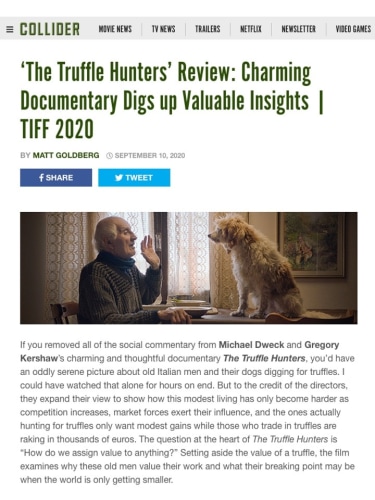‘The Truffle Hunters’ Review: Charming Documentary Digs up Valuable Insights | TIFF 2020
Collider
09/10/2020
Back
By Matt Goldberg
If you removed all of the social commentary from Michael Dweck and Gregory Kershaw’s charming and thoughtful documentary The Truffle Hunters, you’d have an oddly serene picture about old Italian men and their dogs digging for truffles. I could have watched that alone for hours on end. But to the credit of the directors, they expand their view to show how this modest living has only become harder as competition increases, market forces exert their influence, and the ones actually hunting for truffles only want modest gains while those who trade in truffles are raking in thousands of euros. The question at the heart of The Truffle Hunters is “How do we assign value to anything?” Setting aside the value of a truffle, the film examines why these old men value their work and what their breaking point may be when the world is only getting smaller.
Set in Piedmont, Italy, the film quietly follows a group of elderly truffle hunters. We don’t learn too much about their individual lives—no one directly addresses the camera or explains how they got into truffle hunting. Instead, the directors let the story unfold naturally. One man has no family except his beloved dog, and he refuses to share the secrets of his truffle hunting locations. Another man risks getting injured at night while hunting, much to the chagrin of his wife. One truffle hunter has become fed up with the greed that has enveloped the practice of truffle hunting, and no longer wants anything to do with it. While the old men continually reassess whether truffle hunting is still worth pursuing, we see the young and the wealthy profit and dine off the labors of these old truffle hunters.
Similar to last year’s Oscar-nominated Honeyland, The Truffle Hunters is a portrait of a dying way of life as climate change and overpopulation of important areas break the balance between gatherer and resource. While in America we frequently see the death of a livelihood due to outsourcing or automation, in the world of The Truffle Hunters, the problem boils down to basic supply and demand. The value of truffles is astronomical compared to their size—a single kilogram (about 2.2 pounds) can net a seller in the neighborhood of 4,000 euros, which comes out to roughly 4,720 dollars. The challenge is in their rarity and the work to gather them, which falls on the men who have been doing this job for decades. But as others seek truffles, the land becomes scarcer, and the tactics become more cutthroat to the point of poisoning truffle dogs as a way to dissuade these men from continuing their work.
Dweck and Kershaw’s skill is in never needing to voice these economic considerations directly. They’re at the forefront of almost every conversation and the subtext of almost every interaction. Obviously, truffle hunting is a business, but it’s also supposed to be a personal one. It hasn’t been given over to mass automation or agribusiness. It’s an old guy and a dog, the dog sniffs out the truffle, and the man digs up the truffle. From there is where it gets messy as the truffle trade can be costly, and yet it’s all for the benefit of the wealthy. Dweck and Kershaw paint a stark contrast between the men digging down in the dirt for a living and the refined clientele that will bid thousands of dollars for a single truffle.
The cinematography is gorgeous and controlled, showing the beauty of the land and these Italian homes to craft a fairly picturesque life at its end. The directors’ light touch allows you to feel the melancholy of everything coming to an end—both these men’s lives (they’re in their 70s and 80s) as well as their way of life as it gives way to black markets and mercenary forces that simply want to extract as much value as they can from the land before moving on. The difference between the past and presented is in love of the work. One old man knows he could get injured truffle hunting at night, but he loves to do it. He loves going out with his dog and digging in the dirt. The love for what they do is all the romanticism they need, and it contrasts well with the cold, heartless truffle business where one seller remarks that he couldn’t imagine eating a truffle not because he has no taste for them, but simply because he’s always too busy making deals. The maxim of “living to work or working to live” makes for a brilliant dichotomy in The Truffle Hunters.
In its brief runtime, The Truffle Hunters tackles some weighty concepts with a featherlight touch. It’s a film about aging, about work, about the ecosystem, about family, about capitalism, and there are also very good dogs who just want to run around and dig for truffles. Dweck and Kershaw wrap you up in this lovely and melancholy tale while never leaning heavily into any particular direction. Like its elderly truffle hunters, you’ll find yourself wrapped up in the experience, and a little sad when it’s all over.
Rating: B+